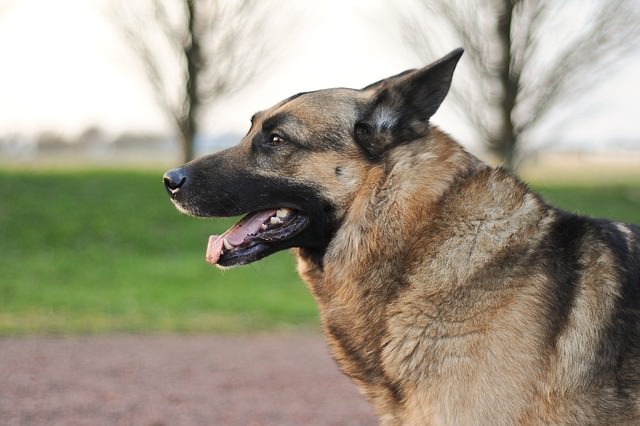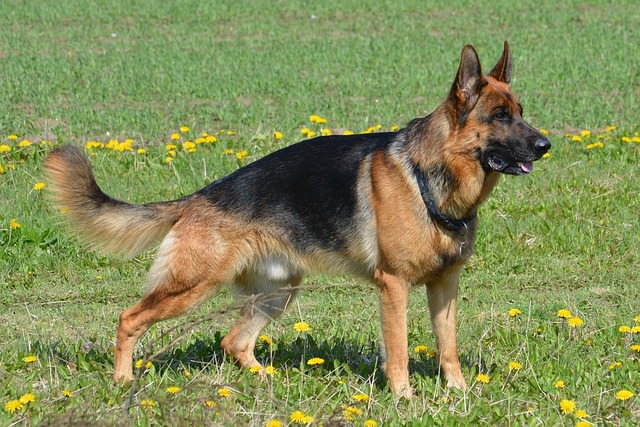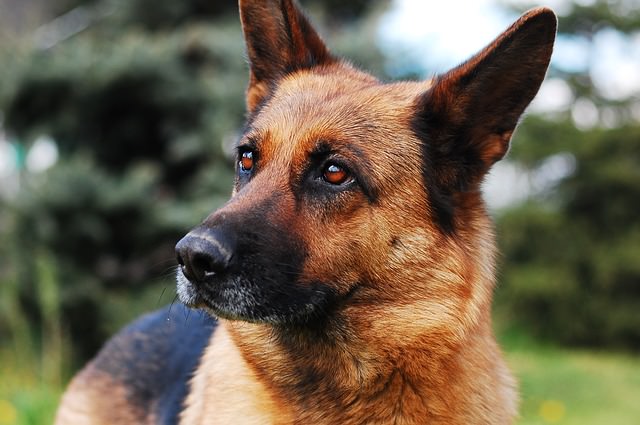German Shepherds are as distinctive a breed as any; people instantly recognize these noble dogs. They are historically our soldiers and protectors. They have been police dogs, sporting friends and couch buddies.
For all their prized traits, they do suffer from certain breed associated disorders that all Shepherd lovers must be aware of. Some of the issues I see regularly in Shepherds are much less common in any other dog, so the genetic and breed association cannot be refuted. This article focuses on the ones that I see most commonly in my practice. Each of these diseases brings to my mind memorable patients that I have treated for these maladies.

#1 – Perianal Fistula
Perianal fistula is a disorder most commonly seen in German Shepherds. The disease is characterized by draining openings on the skin around the anus. Affected dogs may strain to defecate, have diarrhea or bloody stool and lick at the anal area frequently. Some of my Shepherd owners first noticed foul odors on their dog’s bedding as an early sign. Obviously secondary infection in this area is a great risk and because of the many nerves that supply the area, the ailment is painful and debilitating. Scientists and veterinarians have studied the process and many treatments are now available with varying individual success.¹ The aesthetically desirable low tail carriage of these dogs, covering the anus, has contributed to this problem. Studies indicate a high rate of control with dietary manipulation, suggesting a food allergy component and a possible link to inflammatory bowel disease. The disease has been thought to be similar to Crohn’s disease in people.²
Sachi is my favorite patient currently dealing with this issue. Her owners have been sensitive to her issues in this area from early on and have followed all of my recommendations. To date, Sachi’s disease has not significantly progressed and her quality of life is excellent. She is an example of what attentive compliance to veterinary instructions can achieve.

#2 – Megaesophagus
Megaesophagus (from the Greek Mega meaning large) is a condition in which the esophagus (tube that carries food to the stomach when we swallow) becomes limp and is not able to normally pass the food on its way to be digested. The type of megaesophagus that we see in German Shepherds is a congenital problem that a recent study found to correlate to chromosome 12.³ Affected dogs often begin to show signs, vomiting and regurgitation when they are weaned to a solid diet. They usually appear malnourished and may be the “runt” of a litter. Management is lifelong and usually involves liquid diets and elevated feedings, but can differ depending on the individual patient. There is no “cure” for this problem.
Megaesophagus always makes me remember one patient long ago named Charlie. His story is a touching one. He will appear in my next book. His life is a testimony to love and perseverance. He and his family faced his disability with both and just thinking about him makes me smile.

#3 – Hip Dysplasia
Most people by now know about hip dysplasia. The hip joint is a ball and socket joint and hip dysplasia causes malformation of the components leading to instability. There can be abnormalities in the either the ball or the socket (or both) and the chronic laxity causes abnormal wear and leads to osteoarthritis. There is a strong genetic correlation for hip dysplasia in German Shepherds and some other breeds, but a recent study in New Zealand found that only the German Shepherd Dog has shown statistical improvement in the breed for the prevalence of dysplasia despite breeding programs designed to reduce its prevalence in all affected breeds.⁴ Because this is a painful disorder that is genetic in origin, testing and responsible breeding practices are our only way to reduce the occurrence in these and other dogs. The signs in affected dogs can be reduced and managed, but most cases require lifelong management.
If any of you have read my first book, Tennessee Tails: Pets and Their People, the story of Faith is about a German Shepherd Dog who saved her human children from a venomous snake. She went on to show signs of hip dysplasia and I will never forget her radiographs. Her hips were quite possibly the worst I have ever seen, but there was no indication of pain until she was an older dog. She was a brave and fearless blessing to all who knew her. Her chapter is called Faith Under Pressure and I am proud to have been a witness to her story.

#4 – Osteoarthritis
Not all cases of osteoarthritis that I see in German Shepherds are because of hip dysplasia. Many middle aged and older Shepherds are affected with this common disorder. Osteoarthritis can be secondary to injury or just normal wear and tear for these large and active dogs. The pain may be evidenced by an obvious lameness, but can also be present in the spine and have less obvious manifestations. Many times owners do not really notice and think that their dog is just “slowing down”, but ask your vet because I have had miraculous improvements in quality of life for my older Shepherd patients suffering from OA with appropriate treatment.
I have so many patients dealing with this common problem, Shepherd and others, that I could tell 100 stories of courage and peace. If you think that your dog may have trouble with his joints, please ask your vet and if he/she says that there is nothing to be done, ask another. Quality of life can be improved with the right mix of treatments.

#5 – Degenerative Myelopathy
Degenerative myelopathy is a neurologic disease and is a recessive genetic disorder in the German Shepherd Dog.³ Affected dogs are usually middle aged or older patients and this disorder is difficult to distinguish from other causes of spinal cord compromise, like intervertebral disc disease found commonly in many types of dogs. This genetic cause of weakness and paraplegia can only be positively identified postmortem with a histological exam of spinal cord tissue. Affected dogs will experience rear limb weakness that is progressive, eventually leading to paralysis.
Thinking about this disorder makes me especially wistful since my childhood dog, Skip, was suspected to have succumbed to DM. Smiling Skip would hear the school bus before it arrived and be waiting eagerly for me to get home. He didn’t fall ill until I was in vet school, but once the symptoms began, they progressed rapidly and I lost my first love to this disorder. The prognosis for this cause of neurologic signs is not favorable, but it is important to see your vet in case the symptoms are caused by another more treatable disorder.
Over 50 genetic diseases are seen in the German Shepherd Dog. While humans were selecting for the most admirable traits, we inadvertently may have bred for some other less desirable issues. Remember that knowledge is power. If you have a Shepherd, embrace her beauty and intelligence, but keep an eye out for what you can do to head off problems and maintain quality of life for your fearless and loyal friend.
- Compend Contin Educ Vet. 2011 Sep;33(9):E4.Perianal fistulas.Pieper J, McKay L.
- J Am Anim Hosp Assoc. 2008 Nov-Dec;44(6):302-7.Long-term evaluation of canine perianal fistula disease treated with exclusive fish and potato diet and surgical excision. Lombardi RL Marino DJ.
- Mamm Genome. 2012 Feb;23(1-2):203-11. doi: 10.1007/s00335-011-9376-9. Epub 2011 Nov 22. Genome-wide association studies for multiple diseases of the German Shepherd Dog.Tsai KL Noorai RE, Starr-Moss AN, Quignon P, Rinz CJ, Ostrander EA, Steiner JM, Murphy KE, Clark LA.
- N Z Vet J. 2015 Mar;63(2):79-85. doi: 10.1080/00480169.2014.961581. Epub 2015 Jan 27.Genetic evaluation of the total hip score of four populous breeds of dog, as recorded by the New Zealand Veterinary Association Hip Dysplasia Scheme (1991-2011).Soo M, Sneddon NW, Lopez-Villalobos N, Worth AJ.
